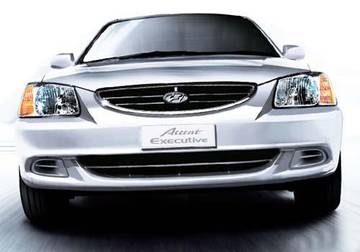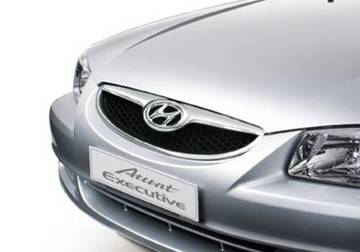Accent GTX Tornado overview
| Engine | 1599 cc |
| Transmission | Manual |
| Mileage | 13.1 kmpl |
| Fuel | Petrol |
Hyundai Accent GTX Tornado price
| Ex-Showroom Price | Rs.7,49,910 |
| RTO | Rs.52,493 |
| Insurance The Insurance amount is calculated based the engine size/battery size of the car and also different for metro cities and other cities. It can also differ from dealer to dealer depending on the insurance provider & commissions. | Rs.58,141 |
| On-Road Price in New Delhi | Rs.8,60,5448,60,544* |
Accent GTX Tornado specifications & features
Engine & Transmission
| Engine Type Engine type in car refers to the type of engine that powers the vehicle. There are many different types of car engines, but the most common are petrol (gasoline) and diesel engines | In-Line Engine |
| Displacement The displacement of an engine is the total volume of all of the cylinders in the engine. Measured in cubic centimetres (cc) | 1599 cc |
| Max Power Power dictates the performance of an engine. It's measured in horsepower (bhp) or metric horsepower (PS). More is better. | 103 PS @ 5800 rpm |
| Max Torque The load-carrying ability of an engine, measured in Newton-metres (Nm) or pound-foot (lb-ft). More is better. | 141 Nm @ 4500 rpm |
| No. of Cylinders ICE engines have one or more cylinders. More cylinders typically mean more smoothness and more power, but it also means more moving parts and less fuel efficiency. | 4 |
| Valves Per Cylinder The number of intake and exhaust valves in each engine cylinder. More valves per cylinder means better engine breathing and better performance but it also adds to cost. | 4 |
| Fuel Supply System Responsible for delivering fuel from the fuel tank into your internal combustion engine (ICE). More sophisticated systems give you better mileage. | MPFI |
| Turbo Charger A device that forces more air into an internal combustion engine. More air can burn more fuel and make more power. Turbochargers utilise exhaust gas energy to make more power. | |
| Super Charge A device that forces more air into an internal combustion engine. More air can burn more fuel and make more power. Superchargers utilise engine power to make more power. | |
| Transmission Type | Manual |
| Gearbox The component containing a set of gears that supply power from the engine to the wheels. It affects speed and fuel efficiency. | 5 Speed |
Fuel & Performance
| Fuel Type | Petrol |
| Petrol Mileage ARAI | 13.1 kmpl |
| Petrol Fuel Tank Capacity The total amount of fuel the car's tank can hold. It tells you how far the car can travel before needing a refill. | 45 Litres |
| Top Speed The maximum speed a car can be driven at. It indicates its performance capability. | 184 kmph |
Suspension, Steering & Brakes
| Front Suspension The system of springs, shock absorbers, and linkages that connects the front wheels to the car body. Reduces jerks over bad surfaces and affects handling. | McPherson Strut |
| Rear Suspension The system of springs, shock absorbers, and linkages that connects the rear wheels to the car body. It impacts ride quality and stability. | Dual Link |
| Shock Absorbers Type The kind of shock absorbers that come in a car. They help reduce jerks when the car goes over bumps and uneven roads. They can be hydraulic or gas-filled. | Coil Spring |
| Steering Type The mechanism by which the car's steering operates, such as manual, power-assisted, or electric. It affecting driving ease. | Power |
| Steering Gear Type Specifies the type of mechanism used to turn the car's wheels, such as rack and pinion or recirculating ball. Affects the feel of the steering. | Rack & Pinion |
| Turning Radius The smallest circular space that needs to make a 180-degree turn. It indicates its manoeuvrability, especially in tight spaces. | 5 meters |
| Front Brake Type Specifies the type of braking system used on the front wheels of the car, like disc or drum brakes. The type of brakes determines the stopping power. | Ventilated Disc |
| Rear Brake Type Specifies the type of braking system used on the rear wheels, like disc or drum brakes, affecting the car's stopping power. | Drum |
| Acceleration The rate at which the car can increase its speed from a standstill. It is a key performance indicator. | 12.5 seconds |
| 0-100kmph The rate at which the car can increase its speed from a standstill. It is a key performance indicator. | 12.5 seconds |
Dimensions & Capacity
| Length The distance from a car's front tip to the farthest point in the back. | 4250 mm |
| Width The width of a car is the horizontal distance between the two outermost points of the car, typically measured at the widest point of the car, such as the wheel wells or the rearview mirrors | 1670 mm |
| Height The height of a car is the vertical distance between the ground and the highest point of the car. It can decide how much space a car has along with it's body type and is also critical in determining it's ability to fit in smaller garages or parking spaces | 1370 mm |
| Seating Capacity The maximum number of people that can legally and comfortably sit in a car. | 5 |
| Ground Clearance Unladen The unladen ground clearance is the vertical distance between the ground and the lowest point of the car when the car is empty. More ground clearnace means when fully loaded your car won't scrape on tall speedbreakers, or broken roads. | 172 mm |
| Wheel Base Distance between the centre of the front and rear wheels. Affects the car’s stability & handling . | 2440 mm |
| Front Tread The distance from the centre of the left tyre to the centre of the right tyre of a four-wheeler's front wheels. Also known as front track. The relation between the front and rear tread/track numbers decides a cars stability. | 1435 mm |
| Rear Tread The distance from the centre of the left tyre to the centre of the right tyre of a fourwheeler's rear wheels. Also known as Rear Track. The relation between the front and rear Tread/Track numbers dictates a cars stability | 1425 mm |
| Kerb Weight Weight of the car without passengers or cargo. Affects performance, fuel efficiency, and suspension behaviour. | 1090 kg |
| Gross Weight The gross weight of a car is the maximum weight that a car can carry which includes the weight of the car itself, the weight of the passengers, and the weight of any cargo that is being carried. Overloading a car is unsafe as it effects handling and could also damage components like the suspension. | 1525 kg |
| No. of Doors The total number of doors in the car, including the boot if it's considered a door. It affects access and convenience. | 4 |
Exterior
| Alloy Wheel Size The diameter of the car's alloy wheels. Alloy wheels are lighter and better looking than standard wheels, not including tyres. | 14 Inch |
| Tyre Size The dimensions of the car's tyres indicating their width, height, and diameter. Important for grip and performance. | 185/60 R14 |
| Tyre Type Tells you the kind of tyres fitted to the car, such as all-season, summer, or winter. It affects grip and performance in different conditions. | Tubeless,Radial |
Compare variants of Hyundai Accent
- Petrol
- Diesel
- CNG
Recommended used Hyundai Accent cars in New Delhi
Accent GTX Tornado images
Hyundai Accent news
With this update, the new S Smart trim is now the most affordable variant with a sunroof and an AMT gearbox
Hyundai Motor, India's second largest carmaker has now stopped production of its entry-level sedan, Accent, which lost the charm it had some years back. In fact, the company has removed the Accent fro
With the release of Accent Hatchback at Montreal Auto show, the Korean automobile giant Hyundai entered in the market with third-generation of Hatchback car segment.
Hyundai Motors is making an official representation of Hyundai Accent in the New York Auto Show on 20th April 2011. The Korean auto company is looking for fresh ways to reveal the new look and feature
Hyundai Accent 2011 will come with a price tag of Rs 501,900 (ex-showroom, New Delhi), the South Korean silently launched the retouched version of Hyundai Accent. The company with the unveiling of the


